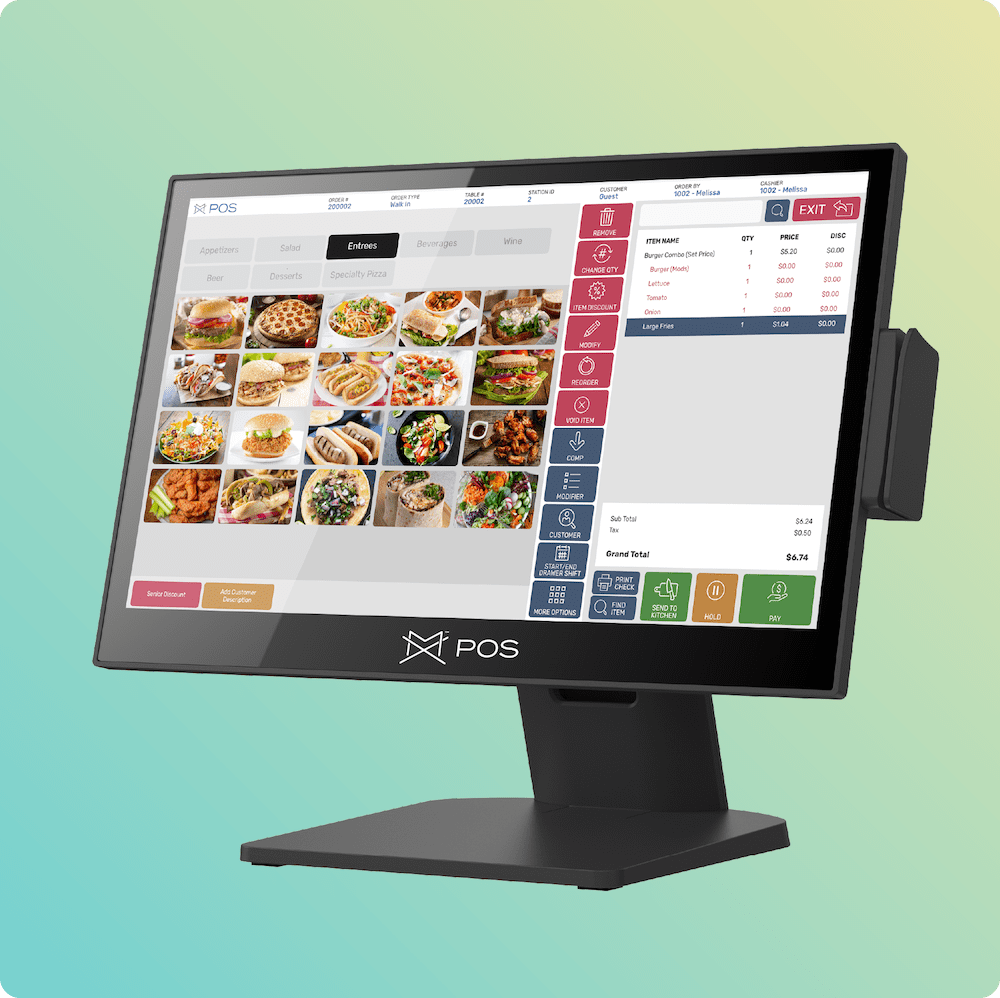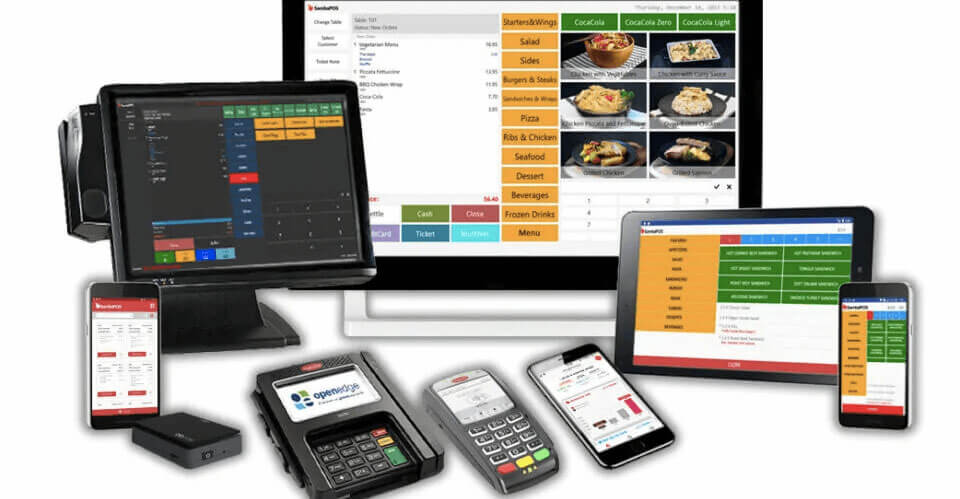Recognizing the Relevance of POS Software in Modern Retail Procedures
In today's retail landscape, the function of POS software has actually become increasingly considerable. These systems have actually transformed from fundamental sales register to diverse devices that boost numerous facets of operations. They not just simplify purchases however additionally give understandings that can shape company approaches. Recognizing how these systems impact client experience and stock monitoring is necessary for any kind of seller looking for to remain affordable. The ramifications of these innovations require additional exploration.
The Evolution of POS Software: From Purchase Processing to Comprehensive Solutions

Enhancing Customer Experience Through Advanced POS Includes

Streamlining Supply Administration With Integrated POS Systems
Integrated POS systems play a crucial function in streamlining supply management by automating procedures that commonly needed considerable hand-operated effort. These systems allow merchants to track supply degrees in genuine time, removing discrepancies that often occur from hands-on supply matters. With functions such as barcode scanning and automatic supply replenishment signals, companies can preserve optimal supply degrees without overstocking or stockouts.Furthermore, integrated POS systems help with accurate forecasting by analyzing historical sales information, enabling sellers to make enlightened purchasing decisions. This predictive capability helps services adapt to altering customer demands and seasonal trends a lot more effectively.Additionally, the centralization of inventory information across several sales channels boosts visibility, allowing retailers to manage their stock a lot more successfully. Eventually, the integration of POS systems right into stock management streamlines operations, lowers human mistake, and adds to raised success.
Real-Time Sales Tracking and Reporting for Informed Decision-Making

Exact supply management lays the foundation for effective sales tracking and reporting. Real-time sales tracking enables retailers to monitor sales efficiency as it happens, supplying prompt insights into customer getting patterns and patterns. This capacity permits services to react swiftly to variations in demand, maximizing supply levels and reducing overstock or stockouts.Moreover, incorporated POS systems assist in the generation of comprehensive records, highlighting vital metrics such as sales by category, amount of time, and private products. Such reporting abilities equip sellers to make data-driven choices, recognizing effective techniques and areas needing renovation.
The Duty of POS Software in Client Partnership Administration
POS software plays a crucial function in boosting client partnership management by making it possible for stores to execute individualized advertising and marketing strategies. By analyzing customer information, organizations can customize promotions and interactions to fulfill specific choices. Additionally, these systems assist in the development of boosted loyalty programs that encourage repeat service and strengthen client engagement.
Personalized Advertising Strategies
As merchants increasingly seek to enhance consumer loyalty and involvement, customized marketing strategies have become a crucial component of efficient customer partnership administration. POS software plays a crucial duty in this procedure by accumulating and examining client data, making it possible for sellers to customize advertising efforts to specific preferences and shopping actions. By leveraging understandings from purchase histories, retailers can produce targeted promos and personalized interactions that reverberate with clients, promoting a much deeper connection. Additionally, the assimilation of POS software with client relationship administration systems enables for smooth monitoring of customer communications, guaranteeing that advertising approaches remain pertinent and prompt (Restaurant POS Software). This data-driven approach not just boosts consumer fulfillment yet additionally drives sales and encourages repeat business, solidifying the store's market setting
Improved Loyalty Programs
Merchants are progressively identifying the significance of commitment programs in promoting long-term customer relationships and enhancing general interaction. POS software plays a necessary role in the advancement and management of these programs, allowing retailers to track consumer purchases, preferences, and habits successfully. By leveraging data analytics, services can develop customized incentives and motivations that reverberate with private customers, consequently raising engagement in loyalty programs. Furthermore, POS systems enable seamless assimilation with mobile apps and digital platforms, assisting in simple accessibility to rewards and promotions. This not only enhances customer fulfillment however likewise drives repeat organization. Eventually, POS software equips sellers to grow much deeper links with their clientele, transforming periodic consumers right into dedicated clients through targeted and purposeful interaction approaches.
Integrating POS Systems With E-Commerce Platforms for Omnichannel Success
To achieve real omnichannel success, smooth integration between point-of-sale (POS) systems and shopping platforms is important. This combination permits merchants to merge their supply monitoring, making Get More Information certain that item availability is accurately shown throughout both online and physical stores. Consumers benefit from a natural purchasing experience, where they can quickly change in between channels without coming across discrepancies.Furthermore, incorporated systems promote real-time information sharing, making it possible for companies to evaluate client actions and choices better. This data-driven approach allows merchants to tailor marketing strategies and optimize stock degrees, eventually improving consumer complete satisfaction and driving sales.Additionally, the ability to process deals throughout platforms simplifies operations, decreasing the threat of mistakes and enhancing general performance. As merchants progressively take on omnichannel methods, the integration of POS systems with shopping platforms continues to be an important consider accomplishing sustainable growth and maintaining competitive benefit in the vibrant retail landscape.
Future Fads in POS Technology and Their Influence On Retail Workflow
As retail operations evolve, future fads in POS innovation are readied to improve the landscape considerably. The rise of cloud-based solutions, technologies in mobile POS systems, and the advantages of AI combination are amongst the key growths anticipated to improve efficiency and consumer experience. These advancements promise to enhance processes and promote a more vibrant retail atmosphere.
Cloud-Based Solutions Increase
With the boosting reliance on innovation, cloud-based POS options are transforming retail operations by offering boosted adaptability and scalability. These systems allow retailers to access real-time data from anywhere, assisting in much better decision-making and customer care. By leveraging cloud infrastructure, organizations can lower ahead of time costs related to software and hardware installations while guaranteeing smooth updates and upkeep. Furthermore, cloud-based services sustain multi-location management, enabling merchants to integrate stock and sales across numerous electrical outlets easily. This flexibility is necessary in today's busy market, where consumer preferences change quickly. As even more sellers adopt these solutions, they can expect improved functional effectiveness and an extra receptive approach to market demands, eventually enhancing consumer satisfaction and loyalty.
Mobile POS Innovations
The development of retail technology continues to shape procedures, specifically with the surge of mobile POS technologies. These systems enable merchants to refine deals anywhere within the store, improving customer interaction and improving checkout processes. Mobile POS remedies improve inventory monitoring by allowing immediate access to stock levels, aiding personnel help customers extra successfully. Additionally, they assist in personalized purchasing experiences get redirected here through integrated client information and commitment programs. As smart phones come to be increasingly sophisticated, sellers are embracing features such as contactless repayments and electronic receipts, in addition maximizing the purchasing journey. The shift towards mobile POS not just increases functional efficiency but likewise straightens with the growing consumer choice for benefit, making certain that retailers remain affordable in a rapidly developing market.
AI Integration Benefits
AI combination represents a transformative leap in POS technology, supplying stores a myriad of advantages that enhance functional efficiency and consumer experience. By leveraging artificial intelligence formulas, merchants can evaluate acquiring patterns and enhance stock administration, reducing waste and stockouts. Furthermore, AI-powered analytics give customized marketing suggestions, enabling targeted promotions that enhance customer engagement and commitment. In addition, chatbots and virtual aides streamline customer care, enabling for quicker resolution of questions and enhancing the general shopping experience. Predictive analytics can also forecast demand trends, allowing find out this here smarter staffing and resource allowance. Eventually, the integration of AI in POS systems empowers sellers to make data-driven decisions, promoting an one-upmanship in an ever-evolving retail landscape.
Frequently Asked Questions
What Are the Prices Connected With Carrying Out POS Software?
The expenses connected with executing POS software can include software licensing costs, hardware expenditures, installation fees, training prices, and continuous upkeep. Each element adds to the overall financial investment required for a successful application.
How Can Small Retailers Benefit From POS Systems?
Little sellers can gain from POS systems via enhanced transaction effectiveness, streamlined supply management, and improved customer insights. These systems allow better decision-making, eventually causing boosted sales and consumer contentment in affordable markets.
What Hardware Is Required for a POS System?
A common POS system calls for important hardware elements, including a touchscreen screen, money cabinet, barcode scanner, invoice printer, and payment terminal. These aspects function with each other to facilitate efficient transaction handling and inventory administration for merchants.

Can POS Software Be Custom-made for Certain Retail Needs?
POS software can undoubtedly be personalized to fulfill particular retail needs. Restaurant POS Software. This adaptability allows companies to tailor functions, interfaces, and reporting devices, enhancing operational performance and offering an extra customized experience for both team and customers
How Secure Is Customer Data in POS Systems?
The protection of client data in POS systems differs commonly. Lots of systems implement file encryption, safe gain access to controls, and routine updates, but vulnerabilities can still exist, demanding ongoing vigilance and proactive actions from merchants to secure sensitive info.